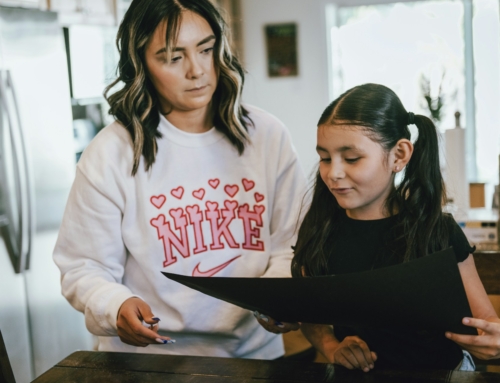What is play therapy for children? Isn’t it just playing? How can that make a lasting impact on my child?
Play therapy is playing with your child, yes – but it’s not justplaying. Play therapists use play in many different forms as a tool and treatment modality when conducting therapy with children.
 A child learns about, observes, and processes the world they live in through play. For children, playing through issues is the equivalent to talking through issues for adults. A child interacting with a therapist through play is the equivalent to an adult engaging with a therapist through conversation.
A child learns about, observes, and processes the world they live in through play. For children, playing through issues is the equivalent to talking through issues for adults. A child interacting with a therapist through play is the equivalent to an adult engaging with a therapist through conversation.
By using play in a therapeutic setting, a child can grow, learn, develop communication skills, develop pro-social skills, learn to regulate their emotions, and much more. Play therapy for children is an evidenced-based intervention that allows children to learn and heal in the most effective way in order to insure long-lasting effects throughout adulthood.
Philosophers and intellectuals have known the importance of play for a child since the time of Plato. It has been known that a child learns about the world around them and how to interact with their environment through play.
Play therapy was first developed into a formal practice in the early 1920’s by a woman by the name of Hermine Hug-Hellmuth. She had children play in the therapy room with the therapist as a way to allow children to express themselves. She also realized that she was able to analyze children’s thoughts and emotions through their play with greater accuracy than just talking with children.
 This practice evolved over the decades to be used for allowing insight into a child’s emotions and thoughts about events in their life. As more research was done, psychologists were able to develop different play techniques to help these children learn how to overcome the emotional struggles they were dealing with.
This practice evolved over the decades to be used for allowing insight into a child’s emotions and thoughts about events in their life. As more research was done, psychologists were able to develop different play techniques to help these children learn how to overcome the emotional struggles they were dealing with.
Play therapy is practiced in many different evidence-based forms today. There is sand tray therapy, directive and non-directive play, cognitive behavioral therapy play, and more.
These methods of therapy are typically used for children under 12 years of age, or until the age where children can think concretely. There has also been research done that play therapy can also be effective for children older than 12 and even adults.
Play therapy is so effective because it is a less threatening way to allow children to open up about himself or herself with the therapist. It is also less like an interrogation with a barrage of questions, and more like play for the children.
Play also allows children to process events in a way that is non-verbal, such as creative visualization, drawing, role-playing, therapeutic storytelling, and even through movement, like dancing. These non-verbal ways of processing are more effective than talk therapy at this age due to the stage of development of a child’s brain.
Have you ever talked to a child about why they are acting the way they are, and they say “I don’t know” or “because”?
Children answer questions like this not just to get out of trouble. They answer this way because their verbal processing skills are not yet developed. They might not know how to express what led them to act in the way that they did, or might not be able to verbalize their thought process. They do not have the skills yet to be able to verbalize to adults their emotions surrounding events in their lives.
 The area of a child’s brain that is responsible for processing complicated emotions, thought, and emotion regulation, the frontal lobe, has not developed completely yet. The frontal lobe does not fully develop until a person is in their late 20’s. Events that a child experiences are stored in other, non-verbal areas of the brain, and are difficult for children under 12 to verbalize to adults.
The area of a child’s brain that is responsible for processing complicated emotions, thought, and emotion regulation, the frontal lobe, has not developed completely yet. The frontal lobe does not fully develop until a person is in their late 20’s. Events that a child experiences are stored in other, non-verbal areas of the brain, and are difficult for children under 12 to verbalize to adults.
Traumatic events and experiences are also stored in these non-verbal areas of the brain where it is hard to verbally process what happened to them, or their emotions and thought around it. This makes it difficult for children to receive therapy where they are expected to heal from their trauma by talking through it.
Using non-verbal interventions through play, such as role-play, drawing, and sand tray allows the child to express these traumatic events without the use of words.
The reason psychologists lean toward using play therapy for children is because it aligns with the client’s brain development and processing skills. This allows for the client to heal from their trauma and learn new ways to handle their emotions for a longer lasting impact on their life, rather than just getting rid of symptoms for the moment.
What Symptoms Does Play Therapy Treat?
Play therapy for children has been proven to be effective in working with children who present with a wide range of symptoms and mental health disorders. A therapist can work with children of all ages, even adults have shown to benefit from play therapy.
Children who have been diagnosed with behavioral disorders such as oppositional defiant disorders or conduct disorder can learn how to handle their emotions in a respectful manner. Children with ADHD learn how to control their energy and tunnel it into something positive.
Clients with anxiety disorders including obsessive-compulsive disorders learn how to be more confident and overcome their anxiety. Children who are diagnosed with developmental disorders such as Autism Spectrum Disorder can learn how to interact socially and learn important skills used for independent living.
Children who are living through a traumatic event or are in crisis, grieving the loss of a close friend or family member, or living through a divorce can heal by engaging in play therapy.
Children who are not diagnosed with anything but are presenting with concerning symptoms such as anger, defiance, social seclusion, anxiety, tantrums, irrational fears, depression, issues communicating, withdrawing, or difficulties learning all show massive improvements in functioning after engaging in play therapy.
How Can Play Therapy Make a Long-Lasting Impact on My Child?
In order to have a long-lasting effect from therapy, the person in therapy needs to learn how to identify and process their emotions in a healthy manner.
 They need to be able to take what they learn in therapy and apply it to their messy and chaotic life outside of the safe and stress-free therapeutic environment. In order to do this, the person needs to learn skills in a way that they can understand and practice those skills over and over.
They need to be able to take what they learn in therapy and apply it to their messy and chaotic life outside of the safe and stress-free therapeutic environment. In order to do this, the person needs to learn skills in a way that they can understand and practice those skills over and over.
Children process emotions, learn skills, and practice these skills through play. In this way, children have long-lasting effects when they engage in play therapy. Children understand play and they can learn and practice the skills that they need to be successful in life into adulthood.
What are the Long-Lasting Impacts for My Child?
Children who have engaged in play therapy experience a multitude of long-lasting effects. Play therapy can build skills for understanding one’s own emotions as well as other’s emotions. This can provide children with the ability to navigate social situations, gain confidence, lessen anxiety, and more.
Children can also learn how to experience emotions in a healthy and productive manner instead of exploding in anger and throwing tantrums in defiance. Play therapy allows children to learn that having emotions is something that everyone experiences.
They learn how to have big feelings like anger without yelling, hitting, or throwing a tantrum. This is important later in life for relationship building, family relationships, romantic relationships, social relationships, and work relationships.
Children learn how to be responsible from their own behaviors and how to develop healthy strategies in dealing with their emotions. Children benefit from play therapy by learning how to develop creative solutions to problems that will help them navigate relationships as well as advance in the work setting.
They will develop a sense of respect for themselves and others, and how to accept the things they cannot change. Play therapy for children provides a learning environment for empathy and respect for others’ thoughts and feelings.
Children will develop confidence, which in turn assures that children will be confident in their abilities to change and grow. All of these skills and more are a product of play therapy and are needed to be a healthy, high functioning, and successful adult in all aspects of life.
What are the Long-Lasting Impacts for My Family?
Play therapy is not only beneficial for children; it is also helpful for the families that they live with. When children learn the skills they need to be successful, the whole family is relieved of the stress of a defiant child who throws tantrums. Because a child is greatly affected by their environment, their environment needs to change in order to maintain the effects of play therapy.
The environment that a child interacts with the most is their family unit. This means that the family unit also needs to learn and grow with the child in therapy in order for the skills learned by the child to be long lasting.
Having at least 15 minutes per day of one-on-one playtime with each child is the recommended amount of time to maintain healthy relationships within the family.
With regard to play therapy, there is a specific type of play therapy called Parent-Child Interactive Therapy. This intervention includes the parent or caregiver of the child playing with their child while a therapist is guiding and teaching the caregiver to play and discipline. It teaches the caregivers how to play with the child in a way that is child-centered, which develops self-esteem, independence, imagination, and more.
Parents also learn through giving commands during play how to discipline effectively when their command is not followed through with. These discipline techniques help children behave not out of fear, but because they have learned how to handle boundaries and emotions.
When a child’s environment is setting the same boundaries as the therapeutic environment, long lasting effects will occur for the child and their families. Parents who learn the skills to play effectively with their children will see more obedience, a stronger bond between family members, less stress, less chaos, greater responsibility, and much more.
Where Can I Find Someone Who Does Play Therapy for Children?
If you have a child who could benefit from these processing skills through play, contact a local therapist. If you are in or around Everett, Washington and looking for a therapist who can bring the values and morals of the Christian faith in with play, come to Everett Christian Counseling. I have had training in child development and have been trained in play therapy. Don’t wait; make an appointment to start your healing and learning process today.
“Coloring time,” courtesy of Aaron Burden, unsplash.com, CC0 License; “Jenga,” courtesy of Michal Parzuchowski, unsplash.com, CC0 License; “Let’s ride,” courtesy of Kelly Sikkema, unsplash.com, CC0 License; “Embrace,” courtesy of Eye for Ebony, unsplash.com, CC0 License










